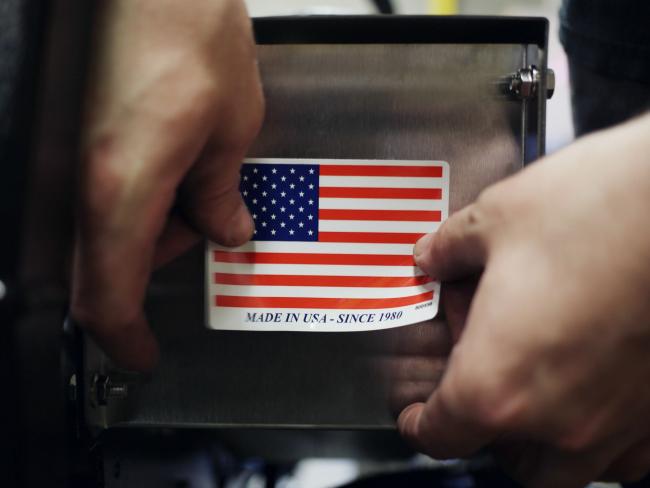(Bloomberg) -- The Biden administration is proposing sweeping changes to its government purchasing rule to increase the content of American-made goods, senior administration officials said.
The new rule is designed in a way that gives contractors time to shift their supply chains but is stringent enough to have an immediate impact on the way taxpayer dollars are used, one official said. President Joe Biden began the process in an executive order he signed in January, shortly after taking office, and the White House has received input from businesses and unions, the officials added.
Biden on Wednesday is set to visit the Mack-Lehigh Valley Operations Manufacturing Facility in Lower Macungie Township in Pennsylvania. He’s scheduled to give remarks in the afternoon on the importance of U.S. manufacturing and buying products made in the country. The plant assembles Mack Trucks.
Under the rule, the domestic content threshold would be raised immediately to 60% -- a 5% increase from existing standards -- and increase in phases to 75% by 2029.
The White House says the immediate change would close a loophole and eventually create more opportunities for small- and medium-sized companies. The proposal would also apply enhanced price preferences to certain critical products to support domestic supply chains for these goods.
The proposal still has to go through a 60-day comment period and only takes effect after a final rule is published. The White House signed off on the proposal in early July but declined to release it until now. Officials said this is just the first set of reforms to existing rules aimed at bolstering American manufacturing and innovation.
Since his campaign last year, Biden promised to ensure that the federal government spends money on buying “made in America” products and in his first cabinet meeting, he instructed each agency to focus their efforts on spending taxpayer dollars in a way that supports U.S. manufacturing.
Under his administration, government agencies have spent more than $2 billion on products produced in the U.S. They include electric vehicles for the Department of Energy’s fleet and the Department of Labor buying $1.5 million of products, from office furniture to safety testing equipment for mines and other workplaces, according to a White House fact sheet.
The president’s proposal comes as federal spending on contracts is increasing, in part because federal agencies are awash in stimulus money to combat the coronavirus pandemic. Federal spending on contracts reached a record high of $682 billion in fiscal year 2020, up 14% from the previous year, according to Bloomberg Government’s federal contracting data. Lockheed Martin Corp (NYSE:LMT)., Raytheon Technologies (NYSE:RTX) Corp. and General Dynamics Corp (NYSE:GD). received a combined $129.5 billion of that spending.
It’s also likely to increase again this fiscal year, which ends in September, because the recent $1.9 trillion stimulus package offers health officials tens of billions of dollars in supplemental funding to continue fighting the coronavirus, including for testing and contact tracing.
The president will have to balance this proposal with promises to reshape federal buying to combat climate change and bolster unions. Earlier this year, he ordered the federal government to buy electric vehicles made in America with union labor, combining all three priorities. There’s just one problem: No such vehicles exist.
The proposal also doesn’t address professional services. Agencies spent roughly $90.3 billion in that area in fiscal 2020, a $6.2 billion increase from the prior year.
©2021 Bloomberg L.P.

